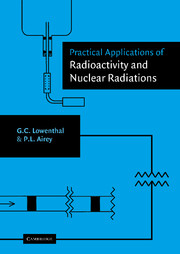Book contents
- Frontmatter
- Contents
- List of illustrations
- List of tables
- Foreword
- Preface
- Chapter 1 Atoms, nuclides and radionuclides
- Chapter 2 Units and standards for radioactivity and radiation dosimetry and rules for radiation protection
- Chapter 3 Properties of radiations emitted from radionuclides
- Chapter 4 Nuclear radiations from a user's perspective
- Chapter 5 Ionising radiation detectors
- Chapter 6 Radioactivity and countrate measurements and the presentation of results
- Chapter 7 Industrial applications of radioisotopes and radiation
- Chapter 8 Application of tracer technology to industry and the environment
- Chapter 9 Radionuclides to protect the environment
- Appendices
- References
- Index
Chapter 7 - Industrial applications of radioisotopes and radiation
Published online by Cambridge University Press: 11 November 2009
- Frontmatter
- Contents
- List of illustrations
- List of tables
- Foreword
- Preface
- Chapter 1 Atoms, nuclides and radionuclides
- Chapter 2 Units and standards for radioactivity and radiation dosimetry and rules for radiation protection
- Chapter 3 Properties of radiations emitted from radionuclides
- Chapter 4 Nuclear radiations from a user's perspective
- Chapter 5 Ionising radiation detectors
- Chapter 6 Radioactivity and countrate measurements and the presentation of results
- Chapter 7 Industrial applications of radioisotopes and radiation
- Chapter 8 Application of tracer technology to industry and the environment
- Chapter 9 Radionuclides to protect the environment
- Appendices
- References
- Index
Summary
Introduction
A change of emphasis
Beginning with this chapter, the emphasis of this book will shift from discussing the science and technology of radioactivity and ionising radiations to considering how they are employed to advance scientific, technological and social objectives. The present chapter will concentrate on industrial applications of X and γ rays, charged particles and neutrons, and also on the applications of high-intensity radiations for chemical processing. Chapter 8 will discuss industrial radiotracing and Chapter 9 the contribution of nuclear techniques to understanding and protecting the environment.
An overview of industrial applications
Summary
The goal of modern manufacturing is to produce quality products as economically as possible using processes designed to minimise adverse impacts on the environment. The processes should result in the maximum efficiency in the use of energy and materials and the minimum generation of waste products.
Nuclear techniques contribute to this goal when applied to:
optimising the efficiency of industrial processes;
diagnosing problems in plant operations;
examining industrial components using non-destructive methods;
analysing the composition and structure of materials;
treating materials with high-energy radiation for the purposes of sterilisation or modification of their properties;
assessing the impact of industrial and urban development on the environment and designing remedial action.
The scope of these applications is outlined below.
Optimisation and control of processes in industrial plant
Optimisation and control of industrial processes depend first and foremost on the measurement of key parameters. In modern industrial plant, these data are often interpreted with the aid of sophisticated mathematical models designed to monitor the processes and to diagnose operational problems.
- Type
- Chapter
- Information
- Practical Applications of Radioactivity and Nuclear Radiations , pp. 181 - 231Publisher: Cambridge University PressPrint publication year: 2001



